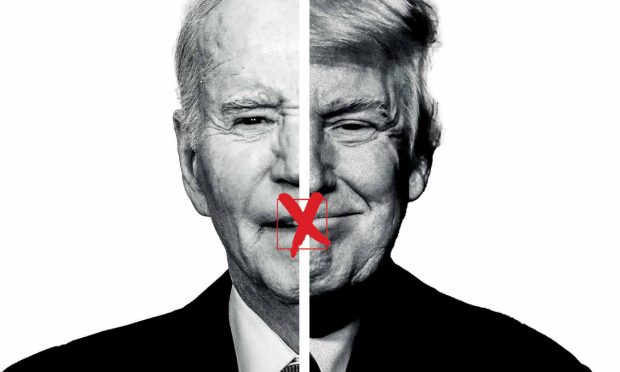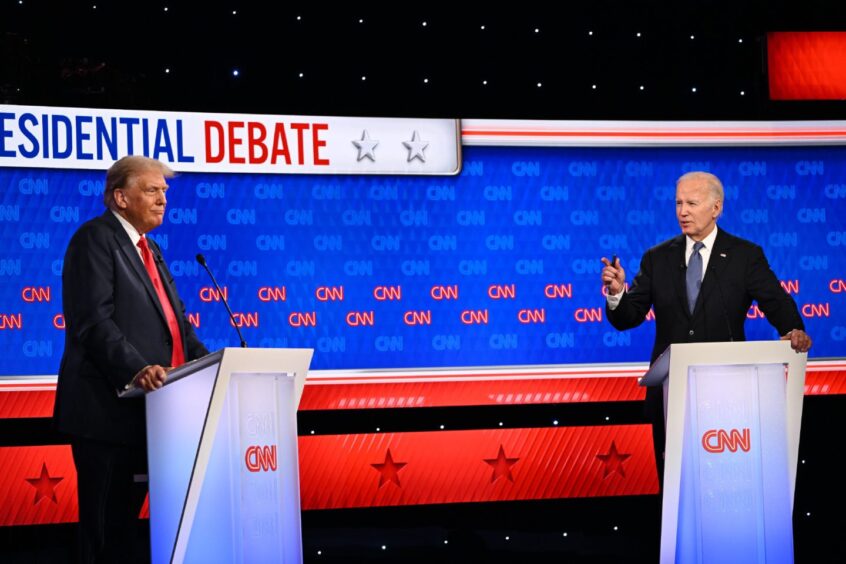
Surely there are many Americans, surrounded by flags this Independence Day weekend, who feel they are trapped on the set of a melodrama that promises them nothing but chaos and confusion, and from which they can’t escape.
This is the most divisive presidential election for more than half a century, bizarre in its twists and turns, and one that promises no easy answers for America.
No suggestion of calm nor a social programme that might bridge the national divide. And that bleak picture alarms much of the rest of the world too, because at a time of turmoil it suggests an even more uncertain future.
Biden v Trump
When internationally there is a titanic struggle between authoritarian regimes of various stripes and the old democracies, the United States might be expected to be a bulwark. Instead there is a potential president in Trump who admires Vladimir Putin and extols his example, believes Nato to be “obsolete”, says he wouldn’t give a penny to Ukraine and treats with indifference Chinese military threats to the independence of Taiwan.
With Biden’s age taking an obvious toll, it’s therefore not surprising that the simple, overwhelming fact about this election is that while a stream of opinion polls show shifting leads (within a fairly narrow band) for either Biden or Trump, depending on which week you choose, regular surveys over the last year suggest a solid consensus among voters on one question. A desire that brings them together. They wish they had a different choice to make on November 5.
What a background to a week in which Trump was due to appear in court in New York for sentencing (now postponed for two months) on the 34 felony convictions for falsifying business records to pay hush money to a porn actress, while Biden scrambles to breathe life into a campaign that had the stuffing knocked out of it by his faltering, dozy performance in his debate with Trump.
If he fails to do that quickly, the pressure from Democrats for a new candidate will be irresistible (remember that Biden will only be nominated formally as the candidate at the Democratic convention in August). For the first time, the odds are moving against him fighting the election.
It’s not supposed to be like this. Until the arrival of Trump on the political scene, less than 10 years ago, Americans of middle-age and over had been used to campaigns that never promised abrupt shifts to right or left.
Even Ronald Reagan, founding father of the new conservative movement, was valued most for his geniality, not his radicalism.
But now the country is angry, bitter and at war with itself. Voters unforgiving of the other side.
Trump’s skill has been in understanding, with a native political instinct, the nature of American unease at the start of the new century. The fear that it’s not going to be America’s to shape as the last one certainly was; a sense that decline might be permanently setting in; worries about a world apparently so complicated that there are no simple answers any more. Giving voice to that unhappiness has been a performance of political near-genius.
Crude, often incoherent, and mendacious in describing his performance in office in the four years after 2016, he has nonetheless proved that it is possible to get a sufficient grip on a little under half of the American voting population – pollsters agree that his ceiling is probably around 46% – to give him a real chance of grabbing the White House again, the state-by-state electoral college system generally working in Republicans’ favour.
Many Democrats are bewildered by this, pointing to Biden’s legislative successes, many of which are popular on the ground. His huge programme of infrastructure spending, for example, is making the changes that Trump promised but never delivered in office.
But this is not enough in a country obsessed by the issues that cluster under the catch-all and inadequate description of “culture wars”.
Abortion and gun laws are maybe the most divisive, but there are dozens more, and America has sunk into a kind of political torpor, albeit a fevered one, from which no-one seems to want to wake up. You stay in your silo, talk to people who agree with you, listen to favourable talk radio stations and watch Fox News or MSNBC according to whether you’re a conservative or a liberal, as if a change of heart is only for wimps.
There has been nothing like this in the US since the Sixties. The Vietnam War divided communities and families and the agonies associated with the civil rights movement and the desegregation of the southern states left the country a battleground.
In the 1968 campaign, Martin Luther King, leader of the civil rights movement, and Robert F Kennedy, the slain president’s brother fighting for the Democratic nomination on an anti-war platform, were assassinated within six weeks of each other.
President Lyndon Johnson, the unlikely southern social reformer who met his political nemesis in Vietnam, had to withdraw from his planned re-election race.
And then the Democratic convention descended into violence on the streets of Chicago thanks to anti-war protests.
The result? A Republican victory for Richard Nixon who, five years later, became the first president to resign, ensnared by the Watergate scandal.
An unwelcome contest
Americans have spent the last few decades hoping never to revisit the chaos of that time.
But now? Politics seems caught once again in a nightmarish trap. Biden-Trump is an unwelcome contest for most voters. Many think Biden is too old. At least as many think Trump is unfit for office on the grounds of his personal behaviour.
The reason for so much despair in Washington and far beyond is that there is no obvious way out. Trump has made clear that if he wins he will wage a partisan campaign against his personal enemies and pursue a unilateralist foreign policy, whatever allies tell him. He will also certainly challenge the result relentlessly if he were to be declared the loser.
And Biden? That faltering uncertainty in the debate was no advertisement for steadiness in office. It was an alarm bell. But can Democrats persuade him that time is against him, without tearing themselves apart in the process?
Both sides are digging in and many voters are turning away. But there’s a country at stake. Its cohesion and its future.
The world can only watch, and share the voters’ bewilderment and foreboding.
James Naughtie is a journalist and political commentator

Enjoy the convenience of having The Sunday Post delivered as a digital ePaper straight to your smartphone, tablet or computer.
Subscribe for only £5.49 a month and enjoy all the benefits of the printed paper as a digital replica.
Subscribe © Xinhua/Shutterstock
© Xinhua/Shutterstock © Robin Rayne/ZUMA Press Wire/Shutterstock
© Robin Rayne/ZUMA Press Wire/Shutterstock